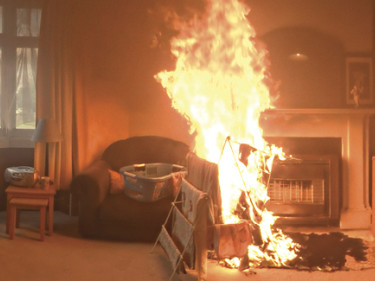If you've been involved in a serious fire, it's important you do not enter your damaged house unless you have to and an emergency services official has told you it's safe to go back in.
We'll check the water, electricity and gas supplies and either arrange to have them disconnected or let you know what to do next.
If you can't enter your home you'll need to arrange accommodation. You may need to stay with family, friends or in a motel for at least 1 night, or longer if there is serious damage to your house.
When your house is safe and you're allowed back, try to find your:
- Identification
- Insurance information
- Medication information
- Eye glasses
- Hearing aid
- Wallet and valuables
If the house is too damaged to live in, you should board up openings to discourage trespassers. You may need to arrange security patrols to protect your house from burglary.
Keep receipts for expenses resulting from the fire such as accommodation or clothes. Get supplies of medicine or eyeglasses.
Who to call
If you've been involved in a fire and need support, call these people and let them know what happened. They may be able to provide support.
- Your insurance company
- Family and friends
- Your employer
- Your child's school
- Your bank or mortgage company
It's also important to contact anybody providing services to your property, such as:
- Post office
- Electricity supplier
- Local council
- Gas supplier
- Phone and Internet provider
They'll be able to talk you through the next steps.
If you're a tenant
Contact your landlord as soon as possible.
If you're a Housing New Zealand tenant, contact your tenancy manager. Or call Housing New Zealand on 0800 801 601.
Who to contact for help:
After a fire, it's normal to feel unsettled and disrupted for a while. You may be able to overcome any problems yourself but don't be afraid to ask for help.
- Victim Support - 0800 VICTIM (0800 842 846)
- Work and Income - 0800 559 009
- Housing New Zealand - 0800 801 601
- Skylight
- Your local church
- Your local Salvation Army
- Local support agencies
View our full list of national support services.
Insurance
If you're insured
Call your insurance company, agent or broker as soon as possible.
They'll tell you what you need to do next, such as securing your house and making a list of damaged items.
Don't remove any items from the property until you've talked to your insurance company. Don't throw away any damaged items in case they need to be assessed. Talk to your insurance company before arranging any repairs.
It's common for insurance companies to investigate claims. Try to remember any events leading up to your fire or other emergency. Make a note of these events and be prepared to answer questions from your insurer.
If you don't have insurance
If you don't have insurance, it may take some time to get back on your feet (depending on the seriousness of the damage).
If you need additional support, the community groups listed above might also be able to offer assistance.














